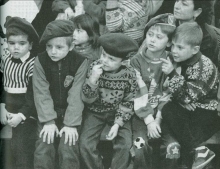International Prisoners for Peace Day has been celebrated on December 1st for years. The purpose of the day is to provoke conversation and commemorate peace prisoners with...
Countering the Militarisation of Youth is a project of War Resisters' International | 2017 | All content of this site is licenced under a Creative Commons Attribution-NonCommercial-ShareAlike 2.0 UK: England & Wales License, unless otherwise stated.
Website development by Netuxo Ltd












